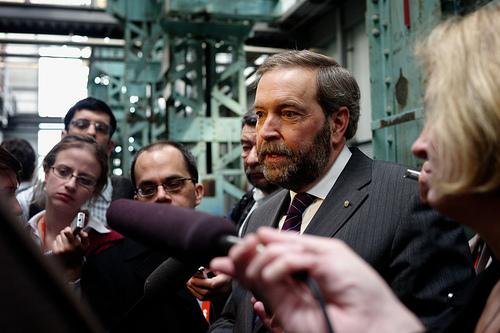Change the conversation, support rabble.ca today.
Should Tom Mulcair be surprised to learn that a chorus of Canadian editorial boards have condemned him for being soft on Quebec sovereignty, and therefore a danger to national unity? That a garage band of pundits and academics has tried to Twitter-fry the NDP for being confused about the Constitution, and what the Supreme Court had to say about secession from Canada?
The media-driven controversy seems strange given that the leader of the Official Opposition has been clear where he stood on Quebec nationalism throughout his career. Mulcair knows, and wants it further understood, that Quebecers will continue to fight to preserve what makes them distinct. In a statement to the House of Commons he pointed out that Quebec twice voted for Canada, and deserves more than the politics of division practiced in the past by the federal Liberals, and the Bloc.
As a Quebecer and a lawyer, he fought on the “no” side in the referendum of 1980; and as a member of the Quebec National Assembly, was even more closely engaged with the “no” forces during the rematch of 1995.
Bona fide credentials do not matter. Mulcair has sinned. Not only do his parliamentarians want to take measures to strengthen the place of French in Quebec, one MP, from Toronto no less, even wants to address the constitutional status of Quebec.
Via a private member’s bill (C-470, An Act respecting constitutional change) submitted by Toronto Danforth MP Craig Scott, a former law professor, the NDP have made specific proposals to deal with Quebec, and the Constitution.
Most importantly, the bill sets out how to answer long-standing provincial grievances by federalists and sovereignists alike surrounding the federal spending power. The bill aims to facilitate innovations such as the opting-out provisions that in the 1960s created simultaneously the Quebec and Canada pension plans.
In the event of an unwanted referendum on sovereignty, following advice set out in the Supreme Court reference on Quebec secession, the bill would require agreement on a clear question, for example: “Should Quebec become a sovereign country?” The bill would also recognize 50 per cent plus one constitutes a majority, which is the one point critics have seized upon.
Mulcair emphasized in the House that in the past two referendum campaigns, a majority was understood to be 50 per cent plus one. The Supreme Court reference referred to a clear majority. The language of the NDP bill says that voting results must be free of irregularities “in the balloting, counting of votes, transmission of results and spending limits.” Nothing less would constitute a clear majority.
As well as being concerned about re-election prospects in his home province, Mulcair wants his party to form a government. Dealing with issues that affect Canada requires the NDP tackle the decades-old strains on confederation surrounding the Quebec question.
Unhappy with the 2000 legislation known as the Clarity Bill, brought in by a Liberal government, pushed by the Reform Party Official Opposition, and with the Bloc Québecois today calling for the Clarity Bill to be withdrawn, Mulcair has new ideas he wants discussed.
Contrary to what editorial writers might think, the Quebec national question is not going away. The proof sits in the National Assembly on the government side behind PQ Premier Pauline Marois, and is measured by continued Bloc support in public opinion polls. Averages collected by the blog ThreeHundredEight.com show continued support for the secessionist Bloc Québecois running at 26 per cent in Quebec (placing them second behind the NDP), or eight per cent nationally (about the same as Green Party support).
The response to the near victory of the “yes” side in 1995, including the poorly named “Clarity Act” was manifestly inadequate. Claude Ryan, who as Quebec Liberal leader headed the No forces in the 1980 referendum, rejected the spirit and the letter of the Chrétien-inspired legislation.
The Chrétien government did not ask what substantive concerns pushed nearly one-half of the population and a solid majority of Francophone Quebecers to vote “yes” in 1995. Instead, Chrétien and the Reform Party focused on giving the federal government a role in approving future referendum questions, and in deciding what result would be acceptable, as if the referendum process itself was the problem.
The Clarity Bill itself is not clear, as Chantal Hébert noted, in effect agreeing with Mulcair. She wrote the Clarity Bill “was not cast in stone” while Anglophone media and academics critical of the NDP and its leader act as if the Bill could not be tampered with, even if it provides no basis for facilitating a new constitutional understanding.
In his speech, Mulcair points out that in the last election, Quebec voted massively for a federalist party, the NDP. Why? Because it wants to strengthen Quebec, and its ties to Canada, not treat it as an adversary.
Duncan Cameron is the president of rabble.ca and writes a weekly column on politics and current affairs.
Photo: Matt Jiggins/Flickr



